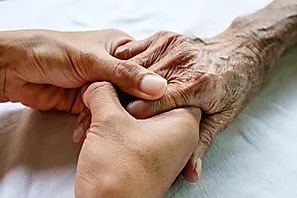5 ideas with helping others find their story


I entered into the dimly lit room to see a little old lady in a robe sitting in the dark in the chair next to her hospital bed. She had been hospitalized for a couple of days waiting on tests, and today was the first day a chaplain had been able to connect with her. Over the next hour, I heard stories of growing up in the South, big family dinners, and working on the farm. I didn't say much that hour. Just letting her to tell the narrative of her life seemed to bring some healing to her soul as she tried to make sense of why she was in the hospital.
Like many of you, I meet many people in my job as a hospital chaplain. Some have nothing, and some want nothing. We meet people who have struggled for their entire lives and those whose lives have been delivered to them on a silver platter. Each one has a story. I have found only a few who want to keep it private.
Most of us go through some trauma in our life. The loss of a close loved one. A major hospitalization. An accident or a violation like robbery or rape. While most of us can incorporate these traumas into the narrative of our lives, others struggle to make the connection between our views of the world and the facts of our traumatic experiences. This can lead to a rupture in our story and to post-traumatic stress.
In his book What Doesn't Kill Us: The New Psychology of Posttraumatic Growth, Stephen Joseph talks about how telling our story can help us come to understand the events that happened to us and lead us towards a path of healing:
"It is through storytelling that we ultimately make sense of our experiences, piece together what happened to us, assimilate information that is concordant without views of self and the world, and accommodate other information that is discordant--while at the same time rebuilding our worldview and our understanding of ourselves."
In a world increasingly dependent on science and medicine, could we overlook one of the greatest tools for our healing… making sense of our own story in the light of adversity?
Chaplains bring unique gifts to the healing process that only sometimes appear in the hospital's bottom line. In the midst of turmoil and confusion, we can help people better come to grips with the narrative of their lives, especially as it relates to their illness or trauma. Joseph goes on to talk about how someone's faith story reshapes who they are:
"Culture-driven stories shape how we all tell our own personal stories and influence our sense of what stories are legitimate to tell. Religion is a powerful force in this regard. And when trauma happens, the stories we tell have the potential to render our pain significant and to give meaning to an otherwise meaningless experience."
When we work with those of other faiths, this can be a difficult task; our experience sometimes varies from the faith or experience of the patient. This is where the ability to listen sympathetically comes in handy. But where we find some common ground and can speak into the lives of our patients the truths of who they are in God's eyes, we can help remind them of the narrative God is writing in their lives.
Retelling our story in light of our faith allows us to see our situation from a larger perspective. It buoys up our soul and allows us to view the trials from a different perspective as part of the story that God is writing. This narrative allows for the sin of man and the grace of God. It also allows us to make sense of the physical and emotional pain that we are going through. It is a story where there is pain, but God's grace and forgiveness abound.
Here are five ideas for helping people with their stories.
Listen to their story. People tell their stories repeatedly to help redefine the narrative until they feel comfortable with it, though some seem to need help getting there. As long as they continue to process the story without getting stuck, it is good to let them process at their speed.
As you listen, reminding them of how God has been working in their lives is okay. Sometimes, it's easier to focus on the story and forget that God is walking with you through it.
Help them understand that bad things happen to all of us. As believers, we are not spared trauma, though we have some resources for making sense of it and finding comfort that others may not have.
Help them explore the meaning of their story. Our life stories make more sense when we understand that they have a purpose.
Help them understand that the story will continue. You may be able to remind them that God and others are there and will give them strength during this time.
One of the greatest honors one can give another person is to ask them about their story. And as it turns out, this can be one of the most healing things you can do.
